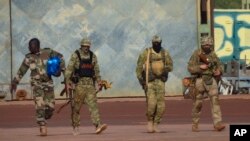Forty-nine African delegations have confirmed their participation, around half of whom will be represented by their heads of state or government, Russian diplomat Alexander Polyakov was cited as saying by the state TASS news agency earlier this month.
But Kremlin spokesman Dmitry Peskov said on Tuesday that the West was doing its best to wreck the Russian event.
"Virtually all African states have been subjected to unprecedented pressure from the U.S., and French embassies on the ground have not been sleeping either along with other Western missions who are also trying to do their bit to prevent this summit from taking place," Peskov told reporters.
"In essence, they do not accept the sovereign right of African states to independently determine their partners for co-operation and mutual interaction in various fields."
U.S. President Joe Biden hosted a U.S.-Africa Leaders Summit in Washington last year, seeking to bolster alliances amid growing Russian and Chinese presence on the continent.
Speaking in April after Russian Foreign Minister Sergei Lavrov complained the West was trying to wreck this week's Russia-Africa summit, the U.S. State Department said that Washington "(doesn't) want to limit African partnerships with other countries. We want to give African countries choices."
Peskov said Russia's event would be crucial to be able to discuss grain supplies and what he called Moscow's responsible behavior and efforts to support world markets.
Moscow announced last week that it was leaving the Black Sea grain deal which allowed Ukraine — which it and much of the West say is fighting an existential war against Russia — to safely export grain from its seaports despite what Russia calls its "special military operation" against it.
Russia has spoken of the possibility of supplying cheap or free grain to Africa's poorest nations to replace Ukrainian grain and make up for any shortfall.

Forum